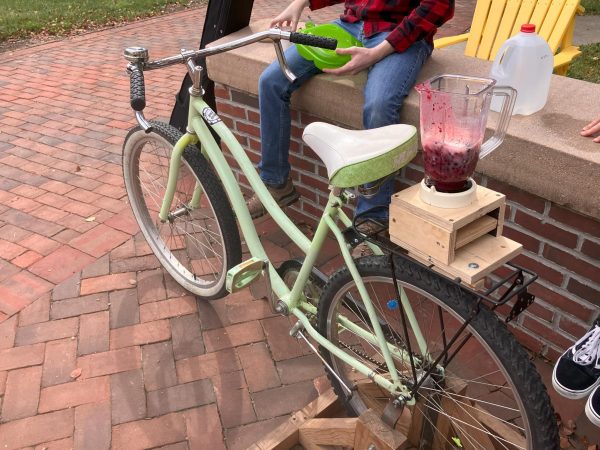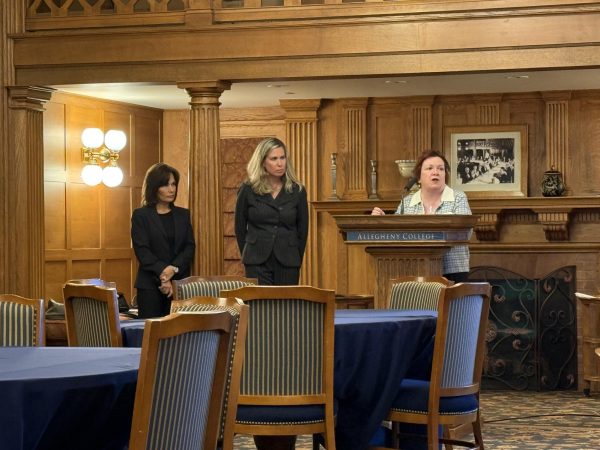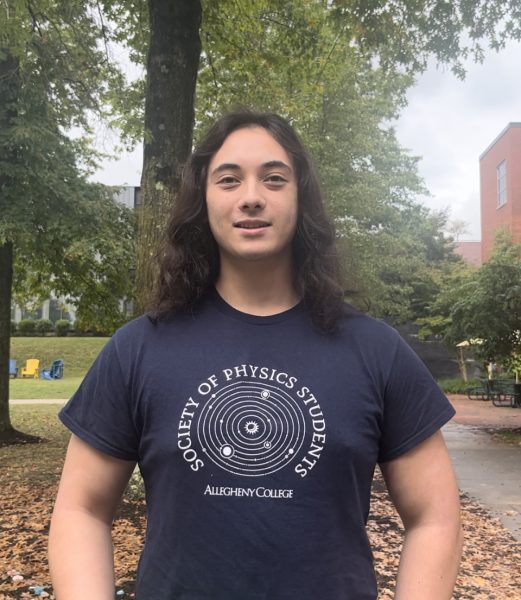Max Kade writer-in-residence teaches through experience
Annual readings at Max Kade House turned out to be a great incentive for those who want to challenge themselves.
On Oct. 18, the annual readings took place in the Max Kade House in North Village, with the participation of German Writer-in-Residence Patrick Findeis, who taught a 7-week creative writing course in German at Allegheny.
“This is a unique opportunity that no other language has,” Assistant Professor of German Julia Ludewig said.
Everything happened in an unusual format. First, Findeis presented his latest work in German and English, and then his students read some of their own creative works, which they wrote in German. By studying the way creative work is written in different languages, students discovered a new way of in-depth language study.
“It was most insightful to listen to my peers read their short stories and hear how much we’ve all progressed over the course,” Samantha Minor, ’24, said. “Also, just being proud that we’re a group of students who are pursuing German and are making every effort to encourage growth within the language for our futures was incredibly cool to think about.”
Ludewig explained that Max Kade was an American businessperson of German descent, who wanted to establish a foundation that allowed intercultural connections to strengthen and support German learning and cultural exchange between Americans and Germans.
From then on, the Max Kade Foundation took pride in participating and sponsoring various programs which encourage the exchange of academic ideas among universities and colleges, both in the United States and in German-speaking countries, according to Ludewig.
Ludewig mentioned that they usually invite not only German writers, but also Austrian and Swiss writers to represent the full cultural diversity of the German-speaking countries.
“They also allow, us through generous funding, to invite a professional writer from a German-speaking country, and every year it’s a different writer who comes to teach a short seven weeks class in creative writing,” Ludewig said.
The course is offered every fall for two credits to intermediate and advanced German students. Then, at the end of that residency program, the writer gives a lecture and reading that is open to the campus community to summarize the course.
Most writers are thrilled to take this opportunity because they only teach this one class, according to Ludewig. They can dedicate themselves to their work, teaching and interacting with students.
“It’s a quite luxurious residency to take,” Ludewig said.
After reading, students were able and encouraged to express themselves creatively in the target language. Having another teacher also means hearing a different accent and learning to be flexible with different speakers.
“Having the course be taught by someone who isn’t a traditional teacher and who lives in Germany was challenging at first because I had to draw on the skills I learned from taking German in a classroom setting and apply them to listening to German for real,” Minor said.
“This is a form of expression that you rarely get in a regular language class,” Ludewig added.
Even though Findeis worked as a teacher in Germany for a long time, this experience was something completely new for him, because students have had different levels of German since the beginning of the course.
“The class was heterogenic, as we noticed, there were students who’ve only (been) learning German for two years, or someone for eight years, so you have to find a balance so that nobody gets bored and drops out,” Findeis said. “(It was) a perfect opportunity to travel to see different places to learn something by myself, for me and to inspire somebody.”
Through the course lenses, Findeis also expressed how tough it can be to connect your life with writing.
“To write something, show it to people and decide to make it survive was a crucial step to me,” Findeis said. “Not like coming out, but it took me quite a long time.”
To show students something particularly German and make their way of learning more interesting, Findeis applied the old tradition of radio drama to classes. With no visual component, radio drama depends on dialog, music and sound effects to help the listener imagine the characters and story.
“It’s something really German,” Findeis said. “Radio drama was always in Germany even before the second world war. Nobody had a T.V. at that time, so people needed the distraction and they came up with radio dramas which are like the theater place just to listen to.”
The resources Findeis used to teach his course partly consists of experimental learning, either for those who teach or those who learn. In the process, Findeis changes the methods to his students` levels.
“The first class I played experimental stuff from the 70s which was a too-high formula, but then I considered that it could be perceived differently for students who are only learning for two years than for eight years,” Findeis said. “So I see the effort the student puts into it.”
Minor took Findeis’ creative writing class and said it was a hard-but-effective way of gaining fluency in a foreign language.
“It certainly was a fun and challenging experience, writing in German creatively is much different from writing in English creatively,” Minor said.
Ludewig gave her insight into its importance and power.
“Efforts to connect language learning with literature was not accidental,” Ludewig said. “(Findeis) did a really good job of bridging the gaps between what’s considered to be proper in terms of German writing as opposed to English while still allowing us as students to express ourselves creatively within our work.”
Having coordinated the program for many years, Ludewig considers it something enriching for German learners on campus.
“Every writer here adds something to the campus,” Ludewig said. “Not just because of the reading, but also because they want to appeal to the entire community, they live on campus and interact with faculty and students. Writers broaden the intellectual life of this campus. And that I think is very important.”





